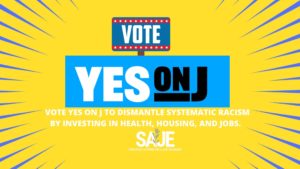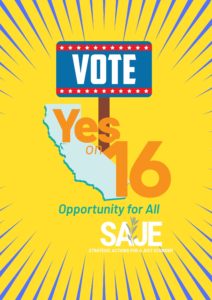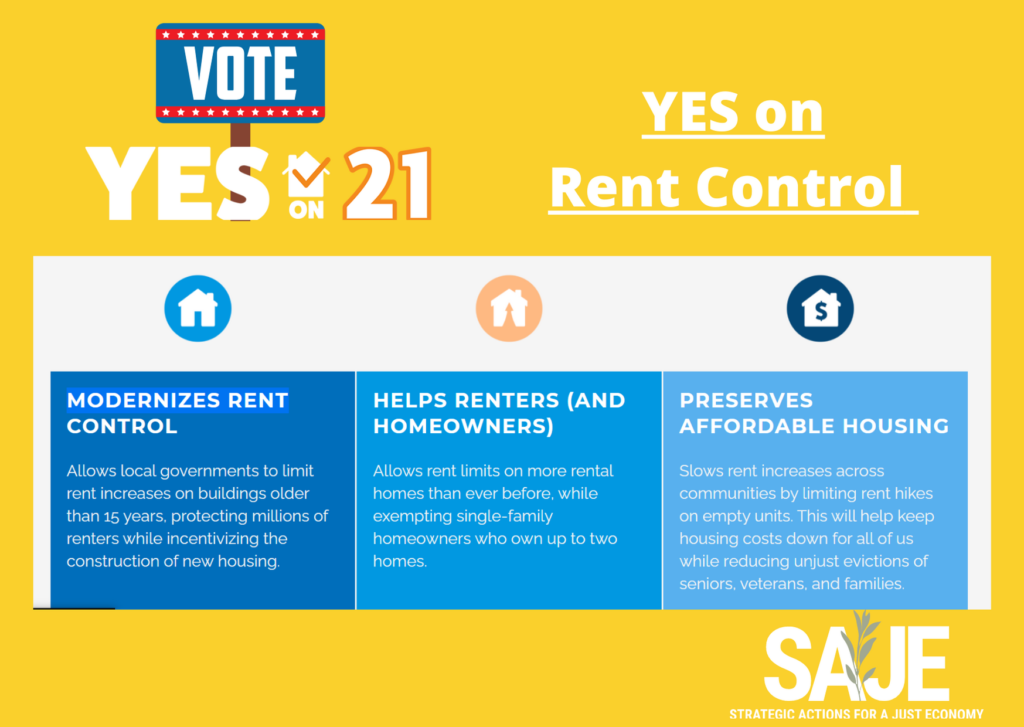This year’s election is about more than who will be president. Your vote is your voice and an opportunity to affect housing, employment, and health care. At SAJE we strive to help our neighbors turn knowledge into political power. This guide will help you get registered to use your voice to build a healthier happier community.
Get Registered
Registering to vote is a crucial first step to making your voice heard. Even if you’ve voted before it’s important to make sure your registration status is up to date.
It only takes a couple of minutes online! You can check your registration status and register to vote at plan.lavote.net. You can also register to vote in-person at your local DMV or by mail. No matter which way you choose, you must do so by October 19th to be a Vote by Mail ballot.
To register online you’ll need a CA Driver’s License or ID number, the last four digits of your social security card, and your date of birth.
YES on Measure J
- Measure J will amend L.A. County’s charter to permanently allocate at least 10% of existing locally-controlled revenues. Voting yes on measure J will shift the County budget to raise nearly $1 billion dollars for direct community investment and alternatives to incarceration.

- Currently the County budget does not reflect the values of our community. 42% of taxpayer money is spent on law enforcement and the legal system. Measure J will takes 10% off the top of County budget to directly invest in community resources.
YES on Prop 15
- Prop 15 would raise taxes on big businesses and corporations, raising billions of dollars in tax revenue for schools and local government. Businesses and corporate landlords are the largest property owners in LA. Now, property owners pay taxes based on the price they originally paid for the real estate. As property values sky rocket the taxes paid on these properties by corporations are very low.
- Voting yes on prop 15 will make sure the wealthiest property owners in Los Angeles pay their fair share in taxes. It will not affect homeowners and businesses with under $3 million dollars or farm land.
YES on Prop 16
- Prop 16 is an opportunity for California to reaffirm its commitment to racial justice and equality. Voting YES on prop 16 would allow universities and businesses to make race, gender, or ethnicity a factor in hiring, spending, and admissions.
- For example, when California did allow affirmative action, state offices set goals for how many contracts they awarded to women-owned and minority-owned businesses. Prop 16 would NOT create racial quotas for university admissions. This practice was banned by the Supreme Court.
YES on Prop 17
- 2020 Voter Guide Prop 17 would allow California parolees to vote. Voting isn’t just about civic responsibility, it’s about representation. Excluding parolees from the right to vote is stigmatizing and damaging for Black and Latinx folks already experiencing hyperincarceration.
- The prop also would allow parolees to run for office if they’re registered to vote and haven’t been convicted of perjury or bribery.

NO on Prop 19
- Real estate lobbyist and corporate interests would love to see Prop 19 approved. Supporters say it will boost home sales and encourage trickle down wealth but in truth it will only boost displacement. Prop 19 is another example of corporations trying to pass off as people and exploit public policy for their own wealth.
- Voting NO on prop 19 will help fight community displacement and stop incentives for pushing mom and pop landlords and elderly property owners out of their homes.
NO on Prop 20
- Prop 20 would give prosecutors the flexibility to treat some property crimes as felonies instead of misdemeanors. In addition, it would require law enforcement to collect DNA samples from people convicted of certain misdemeanors— including shoplifting, forgery and illegal drug possession — to be stored in a state database.
- This year, with more focus than ever before on how the penal system disproportionately harms Black and Latino Americans, is the worst time to revert to a tired, failed approach. Prop 20 would be damaging to Black and Latinx communities and California’s effort to rectify its history of violent over-policing.
YES on Prop 21
- Passing prop 21 would be a major win for tenant rights and the fight against displacement. Prop 21 allows cities to expand rent control measures for nearly all rental housing, 15 years or older.
- Prior to 1995, cities and counties could enact their own rent control laws. Then, state lawmakers passed the Costa-Hawkins Rental Housing Act to curb that power. Voting yes on prop 21 would be one step towards repealing the harmful Costa-Hawkins Act and maintain affordable housing.

NO on Prop 22
- Prop 22 would exempt gig companies like Uber and Lyft from treating their workers as employees. If prop 22 passes former contract workers who are now classified as employees would lose benefits such as overtime pay, health care, paid sick leave, unemployment insurance and workers’ compensation.
- Gig companies undermine job stability and exploit drivers. The pandemic is a prime example of why gig workers need the stricter state laws for worker protections.
Yes on Prop 23
- Under prop 23 kidney dialysis clinics would need have at least one physician present during all operating hours, and to report infection data to the state. It also would require that operators get approval from the state’s health department before closing a clinic, and prohibit clinics from discriminating against patients based on insurance type.
- South Central Los deserves better care than what they receive from many dialysis clinics. These centers are yet another example of corporations discriminating against people of color, in the interests of profits. A yes on prop 23 is a yes for care over corporate wealth.
Neutral on Prop 25
- Prop 25 seeks to transform the California bail system. Cash bail is fundamentally flawed and favors the rich but computers aren’t objective either. People write algorithms and while they may be good at suggesting music they shouldn’t be used to remand justice.
- Prop 25 does nothing to address the inherent racism and biases in our legal system. The factors considered for release will still lead to people of color being held for trial at disproportionate rates.
